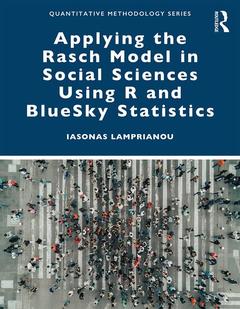Applying the Rasch Model in Social Sciences Using R Quantitative Methodology Series
Auteur : Lamprianou Iasonas

This unique text provides a step-by-step beginner?s guide to applying the Rasch model in R, a probabilistic model used by researchers across the social sciences to measure unobservable ("latent") variables. Each chapter is devoted to one popular Rasch model, ranging from the least to the most complex.
Through a freely available and user-friendly package, BlueSky Statistics, Lamprianou offers a range of options for presenting results, critically examines the strengths and weaknesses of applying the Rasch model in each instance, and suggests more effective methodologies where applicable. With a focus on simple software code which does not assume extensive mathematical knowledge, the reader is initially introduced to the so-called simple Rasch Model to construct a "political activism" variable out of a group of dichotomously scored questions. In subsequent chapters, the book covers everything from the Rating Scale to the Many-facets Rasch model. The final chapter even showcases a complete mock manuscript, demonstrating how a Rasch-based paper on the identification of online hate speech should look like.
Combining theoretical rigor and real-world examples with empirical datasets from published papers, this book is essential reading for students and researchers alike who aspire to use Rasch models in their research.
Chapter 1. Introduction
Chapter 2. "Have you Assaulted a Politician?" Measuring Political Engagement Using the Simple Rasch Model
Chapter 3. Expectations and Residuals
Chapter 4. "All We Need is Love (and Money)!" An Introduction to the Rating Scale Rasch Model
Chapter 5. Relaxing the Common Scale: the Partial Credit Model
Chapter 6. Observations or Subjective Interpretations? A Many-facets Rasch Model
Chapter 7. The Rasch Model as a Generalized Linear Mixed Model
Chapter 8. Publishing a Paper: Detection of Online Hate Speech
References
Index
Iasonas Lamprianou is Assistant Professor of Quantitative Methods at the University of Cyprus. He specializes in the operationalization and measurement of latent variables in the social sciences. Iasonas has a long-standing interest on the application of Rasch models on empirical data and has published widely in diverse disciplines such as education, political science, sociology and psychology.
Date de parution : 12-2019
17.8x22.9 cm
Date de parution : 12-2019
17.8x22.9 cm
Thème d’Applying the Rasch Model in Social Sciences Using R :
Mots-clés :
Rasch Model; MML Estimation Method; R; Rating Scale Rasch Analysis; rasch analysis; GLMM Analysis; datasets; Poor Model Data Fit; research methods; Rating Scale Rasch Model; social sciences; Model Data Fit; psychometric models; Simple Rasch Model; statistical toolbox; Person Item Map; simple model; Tau Estimates; partial credit; Delta Estimate; rating scale; Rasch Estimates; estimation problems; R commander plug in; Item Rest Correlation; R package; Rasch Model Assumes; BlueSky Statistics; Category Deltas; Online Hate Speech; political activism; Hate Speech; Quantitative Research; Rasch Measure; ICC; EAP Estimate; Speeded Coding; Female Coders; Lme4 Package



